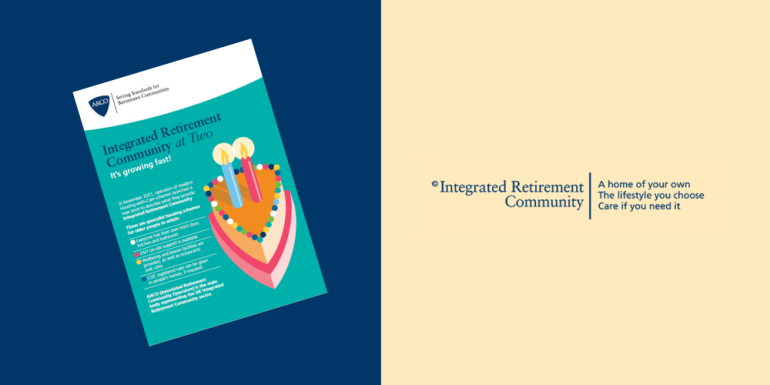- New Scottish Housing-with-Care Task Force calls for action
- Policy change needed to help Scotland keep pace with housing and care revolution
- Social care reform, consumer protection and planning change all needed
Older people in Scotland deserve more choice over specialist housing and care options according to a new group established by ARCO and Sovereign Property Partnership.
The Scottish Housing-with-Care Task Force has been established by Retirement Community operators, legal experts, investors, property experts and local authorities to establish why Scotland is falling behind England and comparable countries such as New Zealand, Australia, Canada and the USA in housing-with-care provision for older people.
The group has committed to investigating a range of barriers holding back provision of the innovative housing and care solution which is playing an increasing role around the world. These include issues such as a lack of recognition in the planning and social care systems and legal challenges in establishing a model to provide key services such as care.
The group includes ARCO (The Associated Retirement Community Operators, the body representing the housing-with-care sector in the UK), Sovereign Property Partnership (Scotland’s leading senior housing consultancy) in addition to representatives from Virgin Money, Burness Paul, Montagu Evans, Lifecare Residences UK, Brodies, Scottish Government, Pinsent Masons, Homes for Scotland, Blackwood Housing, The Healthcare Consultancy, Goldcrest Communities, Cinnamon Retirement Living, Brio Retirement Living and Aberdeenshire Council.
Housing-with-care represents an innovative form of housing for older people that combines independent living with support and care. Also known as extra care, retirement communities or retirement villages, is distinct from both care homes and retirement housing, combining self-contained homes for sale, shared-ownership or rent with 24-hour onsite staffing, CQC registered domiciliary care and a wide range of communal facilities. Despite the benefits it brings for older people’s health and wellbeing, the money it saves for the NHS and social care system, and the homes it frees up for people of all ages, the supply of housing-with-care is low in the UK and particularly in Scotland compared with the demand for it from older people. Currently older people in Scotland have less than a tenth of the provision available to them compared to New Zealand, the USA, Canada or Australia.
Following consistent calls from ARCO, older people’s advocates, charities, investors, local government, academics, and politicians from all parties the UK Housing Minister has publicly confirmed the Westminster Government’s intention to set up a Task Force to make UK-wide proposals for older people’s specialist housing in the near future.
Given the particular shortage of provision in Scotland the coalition described above have taken the initiative in the hope of securing political backing for reform from Holyrood in the coming year. The group is expected to investigate each of these challenges and to issue a report within the year. Ultimately though, access to housing-with-care in Scotland will only improve if the Scottish Government adopts the proposals and puts them into effect.
Andrew Fyfe, Co-Founder of Sovereign Property Partnership and Chair of the Task Force said:
“Housing strategy in Scotland has so far failed to recognise the holistic societal benefits housing with care can provide. Building suitable housing will not only ensure that older members of our society have places to live that best suit their needs, but other benefits include freeing up mainstream housing for younger families and significant savings on the NHS if older patients have a suitable home to return to after hospitalisation.
“It was fantastic to hear the passion and knowledge in the room at the inaugural Scottish Housing-with-Care taskforce. With our population ageing rapidly, now is the time to strike. Both the private and public sector will have an important role to play in boosting supply, but neither can do so without help at Scottish Government level.
“We are really pleased to be working closely with ARCO who have recently persuaded Westminster to chair its first debate on forming a cross-Government taskforce and we want to do the same in Holyrood by providing clear evidence and a range of solutions to barriers hampering the industry thus far. It is vital that housing-with-care forms part of the picture for social care reform, especially in light of what happened in care homes across the country during the pandemic.”
Gareth Lyon, Head of Policy and Communications at ARCO said:
“Older people in Scotland deserve to have a choice over their future housing and care choices. Post-covid, increasing numbers of older people are seeking the security and peace-of-mind which comes from living in a community in which care and support is available but in which they can also live independently. As things stand Scottish older people are less than a tenth as likely to be able to access this kind of support.
“With Scotland’s ageing population, the growing shortage of specialist housing provision and the social care system under increasing strain the time to act is now.
“We are delighted to be working with the Scottish Housing-with-Care Task Force to develop policy solutions and to secure political support for these much needed changes. We hope to see their recommendations adopted at Holyrood in due course.”
ENDS
For Further Information Please Contact
Gareth Lyon, Head of Policy and Communications, at garethlyon@arcouk.org or on 075350 88498
Notes to editors
- About ARCO: Founded in 2012, ARCO (Associated Retirement Community Operators) is the principle body representing both private and not-for-profit operators of housing-with-care schemes in the UK. ARCO’s members aim to provide housing and care solutions to an additional 150,000 people over the next 10 years. We work in three distinct areas, each vital in supporting our Members and growing the sector that helps people to live independently for longer.
- Setting the Policy Agenda: delivered through policy campaigning work with MPs, Peers, Government Ministers, Local Authorities and other key sector stakeholders to influence the future of much-needed sector specific legislation.
- Compliance & Regulation: delivered through our Consumer Code and standards framework, with continual assessments of Members to drive high standards for customer and resident experience.
- Knowledge Sharing and Best Practice: delivered through our extensive events programme, annual What Next? Conference, Network bulletins, online Knowledge Bank, and ARCO Analytics.
- About Retirement Communities/housing-with-care: Retirement Communities sit in between traditional retirement houses (which have less extensive staffing and leisure facilities), and care homes, and can be set in urban or suburban locations. There is a growing body of evidence which shows that Retirement Communities keep older people healthy, well and independent for longer – reducing the overall level of care they need and keeping them out of care homes and hospitals. Currently about 77,000 people live in Retirement Communities in the UK but this number is set to grow to 250,000 people by the end of the decade. Retirement Communities are the fastest growing form of social care provision in the UK – with demand significantly exceeding current supply. Typically consisting of individual one or two bedroom flats or houses, located in a development with similar properties, residents have access to a range of services and facilities, which will include optional on-site care, 24-hour staffing, and dining and leisure facilities, and may also include bars, gyms and craft rooms. Retirement Communities are also sometimes referred to as housing-with-care schemes, retirement villages, extra care housing, assisted living, or close care apartments.
- The benefits of Housing-with-Care: Housing-with-care has shown during the outbreak that it can help residents to self-isolate independently. A particular advantage of this form of retirement provision is that residents can access the highest levels of support from staff through care, meals, regular phone check-ins and a wide range of online activities.
More broadly, housing-with-care brings a range of great benefits to older people and our country as a whole:- Delivering savings to the social care system: Providing social care for those with lower-level needs costs £1,222 (17.8%) less per person per year, and for those with higher-level needs £4,556 (26%) less than in other care settings.
- Boosting health and the NHS: By improving the physical and mental health of residents, costs like GP, nurse and hospital visits reduce by 38%. £5.6bn in cost savings will be made for health and social care if 250,000 over-65s live in housing-with-care by 2030
- Freeing up family homes: 562,000 bedrooms will be released to the market for all generations if the sector achieves its 2030 growth targets.
- Efficient use of land: Apartments for older people are built using up to six times less space than family homes.
- Tackling loneliness: Residents are five times as likely as non-residents to participate in social events, and four times as likely to get together with friends.
These benefits have been clearly demonstrated during the coronavirus outbreak. The provision of care, meals and support onsite has played a key role in keeping residents well and healthy. Housing-with-care has been central to cutting hospital admissions, reducing strain on the NHS and providing crucial step-down capacity once people could leave hospital.
- Our call for a Housing-with-Care Task Force: The coronavirus pandemic has shone a light on our social care system and forced us to reflect on the fact that we need to develop new models of care.
There is a huge gap in the current social care landscape for housing and care options that sit between care homes, and people receiving care in homes that may no longer suit their needs. For older people without acute care needs, the UK needs to grow the provision of models that enable them to live independently for as long as possible: with onsite care and support if needed, boosting health and wellbeing, reducing pressure on the NHS and strengthening social connection.
That’s why ARCO is calling for the swift establishment of a cross-government Housing-with-Care Task Force to accelerate the growth of the housing-with-care sector. Backed by a range of high-profile supporters, we believe a Task Force is the best mechanism through which barriers to growth can be identified, and recommendations for change made. Only by working together can we establish new options that compliment and extend the existing social care landscape in the UK.





